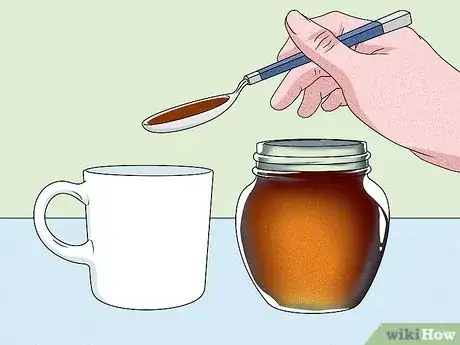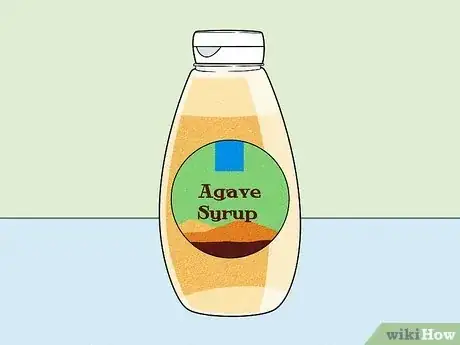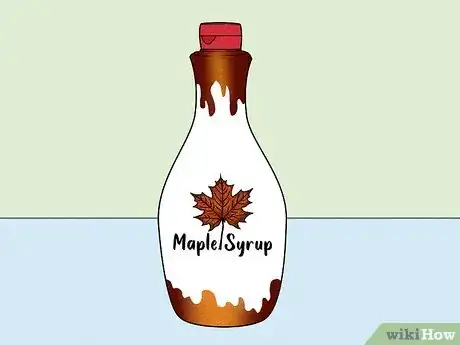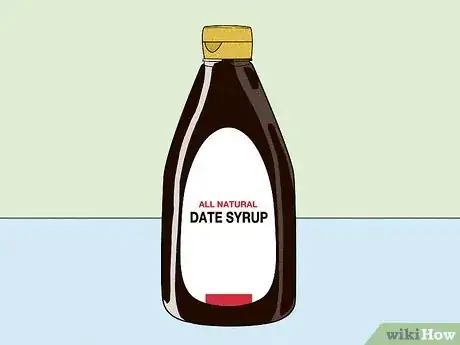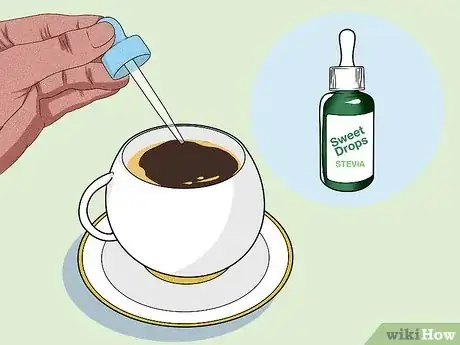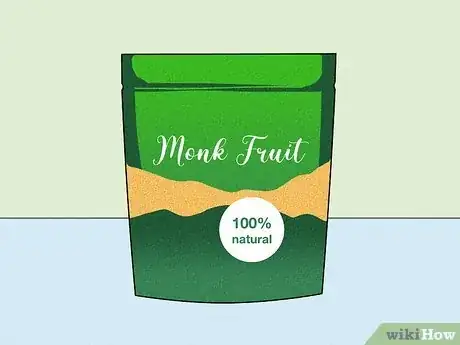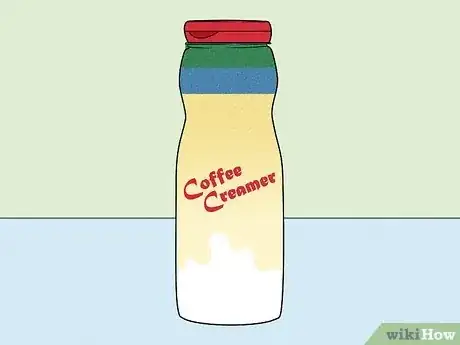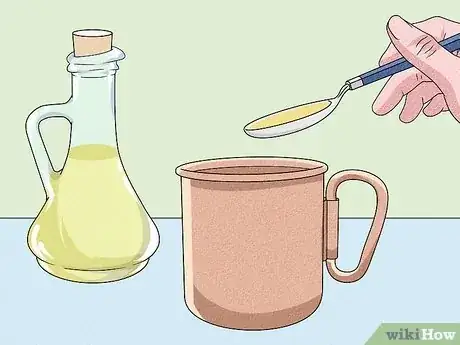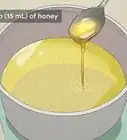This article was co-authored by wikiHow staff writer, Jessica Gibson. Jessica Gibson is a Writer and Editor who's been with wikiHow since 2014. After completing a year of art studies at the Emily Carr University in Vancouver, she graduated from Columbia College with a BA in History. Jessica also completed an MA in History from The University of Oregon in 2013.
There are 13 references cited in this article, which can be found at the bottom of the page.
This article has been viewed 8,634 times.
Learn more...
Cutting back on sugar is an admirable goal, but what if you don't like black coffee? You might be so used to reaching for sugar or your favorite flavored syrup that it's a really tough habit to break. Fortunately, there are lots of healthy ways to sweeten coffee with natural flavorings, spices, and artificial sweeteners. Get your coffee brewing, because we've got a sweet list that you'll want to try!
Things You Should Know
- Try honey, syrup, or molasses for sweet options with more health benefits than regular refined sugar.
- Use cinnamon, vanilla, or cocoa if you prefer to avoid anything sugary.
- Mix in monk fruit or artificial sweeteners if you are aiming for zero-calorie options.
Steps
Honey
-
Add honey for a natural sweetener that has health benefits. Although honey is just as sweet as granulated sugar, it's got health benefits that make it a better choice. Raw honey has antioxidants, prebiotics, and vitamins.[1] X Trustworthy Source Cleveland Clinic Educational website from one of the world's leading hospitals Go to source
- Honey is naturally really sweet and high in calories, so add a little at a time.
- If you're trying to cut back on sugar to reduce inflammation, honey is a great option since it has anti-inflammatory properties.[2] X Trustworthy Source Mayo Clinic Educational website from one of the world's leading hospitals Go to source
Agave syrup
-
Agave is similar to honey, but it's thinner and lighter in flavor. You may have seen agave syrup sitting out at your local coffee shop—it's got the same number of carbohydrates and calories as granulated sugar, but it's got a light, floral flavor. Darker agave has a richer flavor that's also really good in coffee.[3] X Trustworthy Source Cleveland Clinic Educational website from one of the world's leading hospitals Go to source
- Agave syrup is high in fructose although it has a lower glycemic index score than honey. This prevents your blood sugar levels from spiking.
Maple syrup
-
Maple syrup has nutrients and a distinctive taste. You've probably heard that sugar is just empty calories, but that's not the case with maple syrup. While it tends to be sweeter than sugar, it's got antioxidants and a lower glycemic index which means it takes longer for your body to digest it—good news if you don't want to have a sugar crash![4] X Trustworthy Source Cleveland Clinic Educational website from one of the world's leading hospitals Go to source
- Use a light hand when you add maple syrup to your coffee; it's so sweet that a little goes a long way.
- Go for pure maple syrup products instead of pancake or breakfast syrups that are labeled "maple flavor." These usually contain highly processed forms of sugar.
Molasses
-
This thick sweet syrup offers trace minerals and a slightly smoky taste. Molasses isn't as in-your-face sweet as granulated sugar is, but it will definitely sweeten your morning coffee. It has a noticeable bittersweet taste and it's high in magnesium and copper.[5] X Research source
- Add just a little at a time, since too much molasses will make your coffee really bitter.
Date syrup
-
Go with date syrup if you love caramel-like notes in your coffee. Date syrup is thick and has hints of vanilla, so it's a wonderful sugar replacement. It's not as sweet as honey or maple syrup, but it's got twice as much potassium and magnesium.[6] X Research source
- Check the baking aisle of your grocery store for date syrup or shop for it online.
- Date syrup also has 10 times the antioxidants as maple syrup or honey.
Stevia
-
Try stevia if you're looking for a sugar replacement that's sweeter than sugar. Brands like Truvia or PureVia are 200 to 400 times sweeter than granulated sugar, so a little goes a long way! To use stevia, add a few drops of liquid stevia or stir a small spoonful of stevia extract powder into your coffee.[7] X Research source
- Since stevia comes from the leaves of the stevia plant, it's more natural than popular artificial sweeteners.
Monk fruit
-
Use monk fruit if you want a zero-calorie sweetener. This extract from a Chinese fruit is 150 to 200 times sweeter than granulated sugar. It's also got antioxidants and researchers are studying the effects of monk fruit on weight loss. Keep in mind that since it's sweeter than sugar, you won't need to use very much of it.[8] X Trustworthy Source Cleveland Clinic Educational website from one of the world's leading hospitals Go to source
- Monk fruit can be tricky to find, but you may see it at local health food stores or online.
Vanilla extract
-
A few drops of vanilla in your coffee might remind you of bakery treats! Flavored extracts like vanilla don't have any sugar—just intense flavor. Play around with stirring naturally sweet almond extract or peppermint extract into your morning brew.[9] X Research source
- If you're feeling more adventurous, use orange or rum extract.
Cinnamon or cocoa
-
Ingredients like cinnamon or cocoa add flavor without the need for sugar. Add a dash of cinnamon for a warm spice flavor or whisk in a dash of cocoa powder if you like mochas or chocolate. Just use a light hand with the cocoa or your coffee might taste bitter.[10] X Trustworthy Source Cleveland Clinic Educational website from one of the world's leading hospitals Go to source
- Experiment with other spices in your coffee—ground cardamom adds a light, naturally sweet taste or you might enjoy the mild licorice taste of star anise.
- Cinnamon can stabilize your blood sugar and improve your bad cholesterol, while cocoa is a good source of protein and magnesium.
Artificial sweeteners
-
Use an artificial sweetener if you're cutting calories. If you're trying to eat less sugar because you're watching your weight, switch to a sweetener like aspartame, sucralose, or saccharin. These are 200 to 600 times sweeter than granulated sugar, so you don't need very much to make your coffee sweet.[11] X Research source
- Choose an artificial sweetener that has a pleasant taste to you—some people notice a bitter or metallic aftertaste after eating artificial sweeteners like Splenda.
- Sugar alcohols like xylitol, erythritol, and sorbitol are another popular low-calorie replacement although they're not as sweet as artificial sweeteners.[12] X Trustworthy Source Mayo Clinic Educational website from one of the world's leading hospitals Go to source Sugar alcohols naturally occur in plants, although most products are artificial.[13] X Trustworthy Source Cleveland Clinic Educational website from one of the world's leading hospitals Go to source
Creamer
-
Add a splash of dairy or plant-based milk for a smooth taste. Sometimes, stirring in creamer, milk, or a plant-based creamer is enough to cut the bitterness of coffee, so it tastes sweeter on its own. If you like plant-based options, look for unsweetened varieties that have an extra flavor like soy vanilla creamer.[14] X Research source
- Whole milk and half-and-half have a higher fat content than low-fat or skim milk, so they'll naturally taste sweeter.
Butter or coconut oil
-
Healthy fats add a creamy taste that lends a little sweetness. While butter or coconut oil won't make your cup of joe taste as sweet as other options, it will soften the bitterness and give your coffee a rich, rounded flavor. Stir a small spoonful of unsalted butter or coconut oil into your coffee until it dissolves completely.[15] X Research source
- The fats in the butter or coconut oil will float to the surface of the coffee. If you've got a milk frother, insert it and blend your coffee, so these fats emulsify.
You Might Also Like

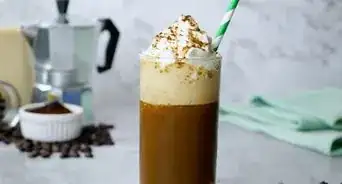 How to Brew a Cup of Instant Coffee: 5 Delicious Methods
How to Brew a Cup of Instant Coffee: 5 Delicious Methods




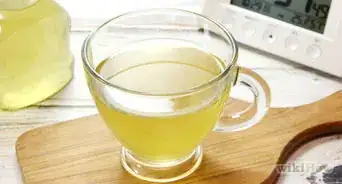
References
- ↑ https://health.clevelandclinic.org/5-best-and-worst-sweeteners-your-dietitians-picks/
- ↑ https://www.mayoclinic.org/drugs-supplements-honey/art-20363819
- ↑ https://health.clevelandclinic.org/5-best-and-worst-sweeteners-your-dietitians-picks/
- ↑ https://health.clevelandclinic.org/is-maple-syrup-better-for-you-than-sugar/
- ↑ https://www.tasteofhome.com/article/9-surprising-uses-molasses-didnt-know/
- ↑ https://www.bonappetit.com/story/date-syrup
- ↑ https://www.hsph.harvard.edu/nutritionsource/healthy-drinks/artificial-sweeteners/
- ↑ https://health.clevelandclinic.org/why-you-should-use-monk-fruit-sweetener/
- ↑ https://www.thekitchn.com/10-ways-to-give-your-coffee-a-shot-of-flavor-239347
- ↑ https://health.clevelandclinic.org/make-your-coffee-healthier-5-tips/
- ↑ https://www.hsph.harvard.edu/nutritionsource/healthy-drinks/artificial-sweeteners/
- ↑ https://www.mayoclinic.org/healthy-lifestyle/nutrition-and-healthy-eating/in-depth/artificial-sweeteners/art-20046936
- ↑ https://health.clevelandclinic.org/what-to-know-about-sugar-alcohols/
- ↑ https://chicagohealthonline.com/healthy-up-your-coffee-drink/
- ↑ https://www.thekitchn.com/10-ways-to-give-your-coffee-a-shot-of-flavor-239347
- ↑ https://www.thekitchn.com/9-surprising-things-to-add-to-coffee-beyond-cream-sugar-smart-coffee-for-regular-joes-203866
About This Article

